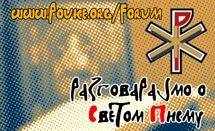Проповједник, глава 8
Ко је као мудри? и ко зна шта значе ствари? Мудрост просвјетљује човјеку лице, а тврдоћа лица његова мијења се.
Who [is] as the wise [man]? and who knoweth the interpretation of a thing? a man's wisdom maketh his face to shine, and the boldness of his face shall be changed.
Ја ти кажем: извршуј заповијест цареву, и то заклетве Божије ради.
I [counsel thee] to keep the king's commandment, and [that] in regard of the oath of God.
Не буди брз да отидеш испред њега; не стој у злој ствари, јер ће учинити што год хоће.
Be not hasty to go out of his sight: stand not in an evil thing; for he doeth whatsoever pleaseth him.
Јер гдје је год ријеч царева ондје је власт, и ко ће му рећи: шта радиш?
Where the word of a king [is, there is] power: and who may say unto him, What doest thou?
Ко извршује заповјест, неће знати за зло, јер срце мудрога зна вријеме и начин.
Whoso keepeth the commandment shall feel no evil thing: and a wise man's heart discerneth both time and judgment.
Јер свачему има вријеме и начин; али многа зла сналазе човјека,
Because to every purpose there is time and judgment, therefore the misery of man [is] great upon him.
Што не зна шта ће бити; јер кад ће што бити, ко ће му казати?
For he knoweth not that which shall be: for who can tell him when it shall be?
Човјек није властан над духом да би уставио дух, нити има власти над даном смртнијем, нити има обране у тој борби; ни безбожност не избавља онога у кога је.
[There is] no man that hath power over the spirit to retain the spirit; neither [hath he] power in the day of death: and [there is] no discharge in [that] war; neither shall wickedness deliver those that are given to it.
Све ово видјех, и управих срце своје на све што се ради под сунцем. Каткад влада човјек над човјеком на зло његово.
All this have I seen, and applied my heart unto every work that is done under the sun: [there is] a time wherein one man ruleth over another to his own hurt.
И тада видјех безбожнике погребене, гдје се вратише; а који добро чињаху отидоше са светога мјеста и бише заборављени у граду. И то је таштина.
And so I saw the wicked buried, who had come and gone from the place of the holy, and they were forgotten in the city where they had so done: this [is] also vanity.
Што нема одмах осуде за зло дјело, зато срце синова људских кипи у њима да чине зло.
Because sentence against an evil work is not executed speedily, therefore the heart of the sons of men is fully set in them to do evil.
Нека грјешник сто пута чини зло и одгађа му се, ја ипак знам да ће бити добро онима који се боје Бога, који се боје лица његова.
Though a sinner do evil an hundred times, and his [days] be prolonged, yet surely I know that it shall be well with them that fear God, which fear before him:
А безбожнику неће бити добро, нити ће му се продуљити дани, него ће бити као сјен ономе који се не боји лица Божијега.
But it shall not be well with the wicked, neither shall he prolong [his] days, [which are] as a shadow; because he feareth not before God.
Таштина је која бива на земљи што има праведника којима бива по дјелима безбожничким, а има безбожника којима бива по дјелима праведничким. Рекох: и то је таштина.
There is a vanity which is done upon the earth; that there be just [men], unto whom it happeneth according to the work of the wicked; again, there be wicked [men], to whom it happeneth according to the work of the righteous: I said that this also [is] vanity.
Зато ја хвалих весеље, јер нема ништа боље човјеку под сунцем него да једе и пије и да се весели; и то му је од труда његова за живота његова, који му Бог да под сунцем.
Then I commended mirth, because a man hath no better thing under the sun, than to eat, and to drink, and to be merry: for that shall abide with him of his labour the days of his life, which God giveth him under the sun.
Кад управих срце своје да познам мудрост и видим шта се ради на земљи, те ни дању ни ноћу не долази човјеку сан на очи,
When I applied mine heart to know wisdom, and to see the business that is done upon the earth: (for also [there is that] neither day nor night seeth sleep with his eyes:)
Видјех на свијем дјелима Божијим да човјек не може докучити оно што се ради под сунцем, око чега се труди човјек тражећи, али не налази, и ако и мудрац рече да зна, ипак не може докучити.
Then I beheld all the work of God, that a man cannot find out the work that is done under the sun: because though a man labour to seek [it] out, yet he shall not find [it]; yea further; though a wise [man] think to know [it], yet shall he not be able to find [it].








